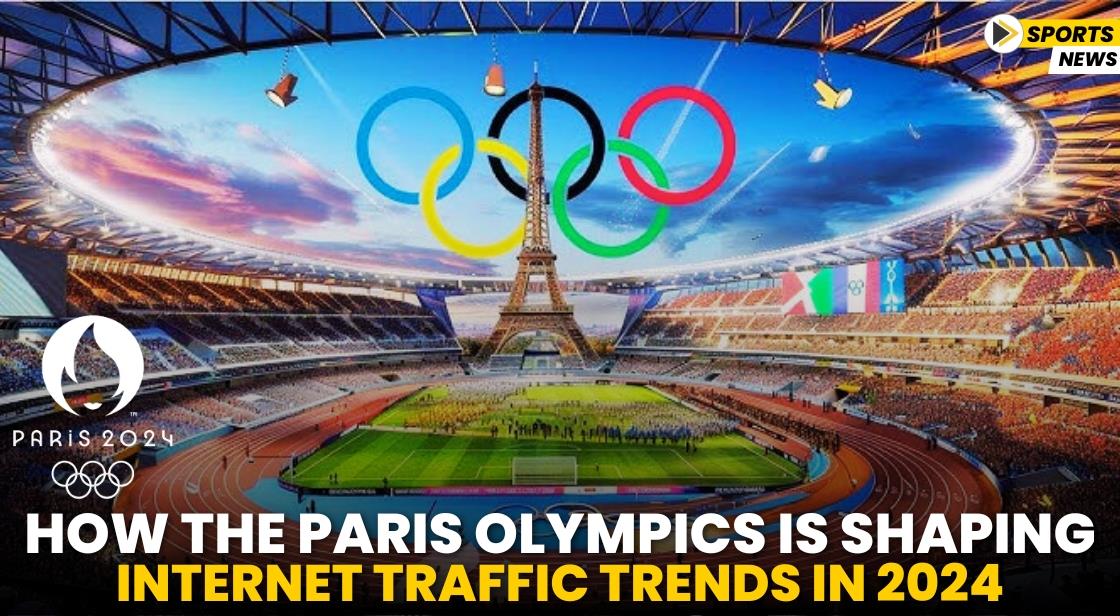How the Paris Olympics is Shaping Internet Traffic Trends in 2024

News Synopsis
The Paris 2024 Summer Olympics has significantly influenced global internet traffic patterns. Cloudflare, a prominent American company specializing in content delivery network services, has tracked these changes starting from the first full competition day on July 27. The data reveals interesting trends in various countries, highlighting how major sporting events can impact digital activity worldwide.
The Paris 2024 Summer Olympics and Its Impact on Internet Traffic
Impact on Internet Traffic by Country
United States
In the United States, internet traffic saw notable fluctuations during the Olympics. Specifically, between July 26 and July 28, there was a substantial dip in traffic during events involving gold medalist Simone Biles. Her events caused the most significant traffic decrease, underscoring how major athletic achievements can affect online behavior.
France
For the host nation, France, the impact was marked by French swimmer Léon Marchand’s gold medal performance in the men’s 400-meter individual medley on July 28. His record-setting achievement led to a significant 17% drop in traffic during his event. This drop indicates a high level of national interest and engagement in Olympic events, reflecting how local heroes can affect online activity.
Australia
In Australia, the effect of the Olympics was evident during Mollie O'Callaghan’s victory in the women’s 200m freestyle on July 29. Traffic in Australia fell by 5% compared to the previous week. This reduction in traffic coincides with her gold medal win, illustrating how major sports victories can influence digital engagement levels.
South Korea
South Korea experienced an 8% decline in internet traffic following the Korean women’s archery team’s gold medal win on July 28. This decrease highlights the global trend of internet traffic shifts corresponding with significant Olympic moments, particularly in countries with strong national representation.
Cybersecurity and Olympic-Themed Phishing Attacks
Increased Phishing and Spam
Major events like the Olympics attract not only sports enthusiasts but also cybercriminals. Cloudflare’s Cloud Email Security service has detected a sharp increase in phishing and spam emails related to the Olympics. From January 2024 through late July, over one million emails with “Olympics” or “Paris 2024” in the subject line were processed.
During the week of July 22-28, which aligned with the early days of the Olympics, there was a staggering 304% increase in such emails compared to the previous week. This represents a 3111% rise compared to the busiest week in January, emphasizing how major events can amplify cybersecurity risks.
DNS Request Traffic Analysis
Top Countries by DNS Request Traffic
An analysis of DNS request traffic for Olympic sites on July 27, the first full day of competitions, reveals the countries with the highest shares of requests. The top ten countries were:
-
United States: 16%
-
Germany: 12%
-
France: 9%
-
Vietnam: 9%
-
Brazil: 5%
-
Australia: 5%
-
United Kingdom: 4%
-
Netherlands: 4%
-
Canada: 3%
-
South Africa: 2%
These figures reflect global interest in the Olympics, with a notable share of traffic coming from both Olympic host and participating countries. The significant presence of the United States and Germany in the top ranks indicates their strong engagement with the Games, while the presence of Vietnam and Brazil highlights the global reach of Olympic interest.
Conclusion
The Paris 2024 Summer Olympics has significantly influenced internet traffic across the globe, demonstrating how major international events can affect online behavior. According to Cloudflare’s data, there were noticeable declines in internet traffic during key Olympic moments, such as Simone Biles' performances in the U.S., Léon Marchand's gold medal swim in France, and other major events in Australia and South Korea. This drop in traffic during these high-profile events highlights the shifts in online engagement as audiences focus on live sports.
Moreover, the Olympics have spurred a dramatic increase in phishing and spam emails. Cloudflare reported a staggering rise in emails containing "Olympics" or "Paris 2024" in their subjects during the event’s early days, underscoring the heightened cybersecurity risks associated with global events. This surge in malicious activity underscores the need for enhanced digital security measures to protect users from increased threats during such high-profile occasions. As the Olympics progress, these digital trends are expected to continue evolving, reflecting the complex interplay between global sports events and online activity.
History of Olympic
The history of the Olympic Games is rich and spans over a millennium. Here’s a concise overview:
Ancient Olympics:
- Origins: The ancient Olympic Games began in Olympia, Greece, in 776 BCE. They were held every four years in honor of Zeus, the king of the Greek gods.
- Events: Initially, the Games featured only a single event, the stade race, a foot race of approximately 192 meters. Over time, events expanded to include wrestling, boxing, chariot racing, and pentathlon (a combination of five events: running, long jump, discus throw, javelin throw, and wrestling).
- Athletes: Competitors were typically Greek men who competed in the nude, and winners were awarded olive wreaths and immense honor.
Roman Period:
- End of Ancient Olympics: The Games continued until 393 CE, when Emperor Theodosius I banned them as part of his campaign to suppress pagan practices. The Games fell into obscurity as Rome's influence grew.
Modern Olympics:
- Revival: The modern Olympic Games were revived in 1896 by Pierre de Coubertin, a French educator. Inspired by the ancient tradition, he sought to promote international understanding and peace through sports.
- First Modern Games: The inaugural modern Olympics were held in Athens, Greece, from April 6 to April 15, 1896. It featured 13 nations and 43 events in athletics, swimming, gymnastics, wrestling, and more.
- Expansion: Since then, the Olympics have grown substantially. The Games now feature thousands of athletes from nearly every country competing in a wide range of sports. The Winter Olympics, introduced in 1924, and the Paralympic Games, which began in 1960, further expanded the Olympic movement.
Recent Developments:
- Global Reach: The Olympics have become a global spectacle, with significant media coverage and commercial investment. The Games are held every four years, with separate Winter and Summer events.
- Host Cities: The host city changes every four years, with recent locations including Tokyo (2021), Beijing (2022 Winter), and Paris (2024).
Key Themes:
- Olympic Values: The Olympics are built on ideals of excellence, friendship, and respect. They promote unity, celebrate human potential, and foster peace through sport.
- Cultural Impact: The Games have a profound impact on global culture, economy, and politics, influencing everything from sports development to urban planning and international relations.
This history reflects the Olympic Games' evolution from a local Greek festival to a global celebration of athletic achievement and international camaraderie.
You May Like









